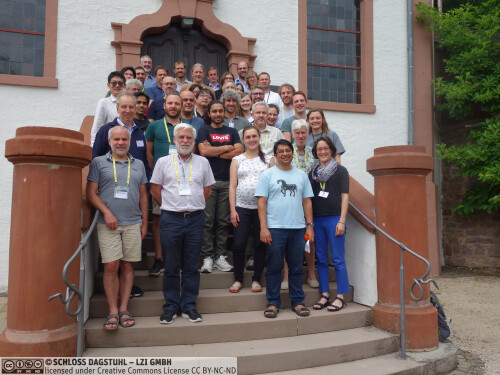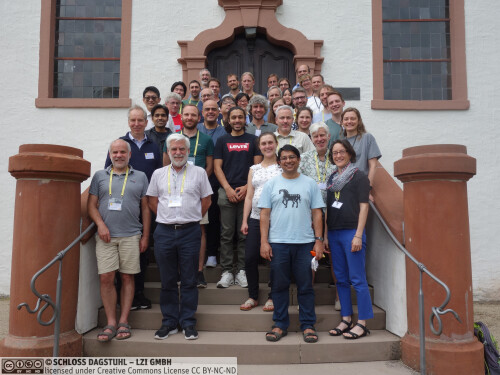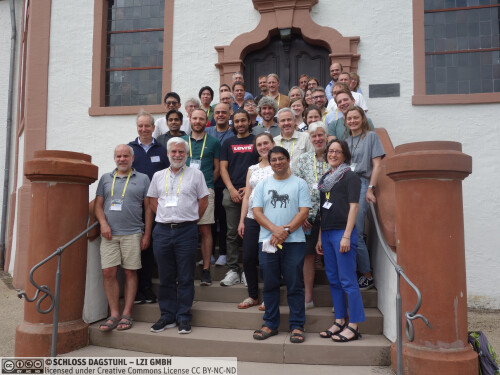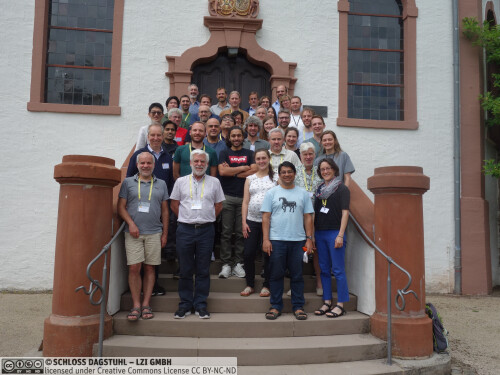Dagstuhl Seminar 24281
Dynamic Traffic Models in Transportation Science
( Jul 07 – Jul 12, 2024 )
Permalink
Organizers
- José R. Correa (University of Chile - Santiago de Chile, CL)
- Carolina Osorio (HEC - Montréal, CA & Google Research - Mountain View, US)
- Laura Vargas Koch (Universität Bonn, DE)
- David Watling (University of Leeds, GB)
Contact
- Andreas Dolzmann (for scientific matters)
- Susanne Bach-Bernhard (for administrative matters)
Impacts
- On the Approximability of Train Routing and the Min-Max Disjoint Paths Problem : article in In: 33rd Annual European Symposium on Algorithms - Bhaskar, Umang; Eickhoff, Katharina; Kauther, Lennart; Matuschke, Jannik; Peis, Britta; Vargas Koch, Laura - Wadern : LZI, 2025 - (Leibniz International Proceedings in Informatics ; 351 : article).
- On-Off Systems with Strategic Customers - Sun, Yanwei; Liu, Zhe; Yan, Chiwei - Cornell University : arXiv.org, 2025. - 73 pp..
- An Equilibrium Solver for A Dynamic Queueing Game - Cerna, Denise; Yan, Chiwei Ma, Hongyao - SSRN, 2025. - 40 pp..
- Nash Flows Over Time with Tolls - Rosner, Shaul; Schröder, Marc; Vargas Koch, Laura - Cornell University : arXiv.org, 2025. - 23 pp..
Schedule
Transportation road networks and the underlying spatio-temporal dynamics of vehicular traffic are increasingly complex. City infrastructure is increasingly real-time and traffic-responsive, urban mobility services are increasingly flexible, multi-modal and tailored to the heterogeneous needs and preferences of the traveling population, road assets are increasingly shared between the transport of individuals and the transport of freight and goods. Importantly, operators and users of the road network increasingly focus on the sustainability of their choices or service offerings. The key sustainability metrics (e.g., greenhouse gas emissions and energy consumption) are tightly linked to the underlying traffic dynamics.
Dynamic traffic assignment models are, therefore, critical tools for transport planners to be able to predict the spatio-temporal distribution of traffic – and thereby the congestion, environmental and social impacts – of transport policies, for example, in the light of possible changes to the infrastructure (e.g. traffic light control), to the transport services offered (e.g., the provision of public transport fleets and frequencies), or to the prices imposed on travelers (e.g., congestion pricing, public transport fares). The prevailing approaches used in the transportation science literature to predict such distributions can be roughly classified into mathematical approaches based on dynamic traffic assignment models (DTA) (using the methodology of flows over time) and simulation-based approaches (using large-scale microsimulations). The striking advantage of microscopic simulations over DTA models is that the latter usually ignore practically relevant side constraints such as horizontal queueing of vehicles, the feedback of changing network conditions on user behavior, flexible departure time choice, mode choice, and activity schedule choice. Current simulation tools integrate all these dimensions and many more. The increase in model complexity inherent in simulations, however, is not matched by the existing DTA theory. For most simulation software, there is no “mathematical proof of concept”. This means it is not known whether equilibria always exist and the heuristics applied in traffic simulation lead to (approximate) equilibria. Moreover, crucial properties for simulations to give meaningful results, such as uniqueness and continuity of equilibria, are only partially understood.
In the Dagstuhl Seminar, we brought together, for the fourth time, leading researchers from three different communities (Simulations, Dynamic Traffic Assignment, and Algorithmic Game Theory) in order to bridge the gap between complex simulation-based models and the existing theory. In the last four seminars, we made substantial progress by answering questions, e.g., on the controllability of traffic flow or the analysis of equilibria with spatial queues. Still, real-world simulation develops faster than mathematical theory, and at the same time, new challenges in modeling future road networks arise, which are characterized by real-time responsiveness, flexible multi-modal urban mobility offerings, automated and autonomous vehicles, coordinated fleets of vehicles, and environmentally sustainable operations. This seminar focused on these new questions with multiple talks on sustainability in traffic simulation in general and more concrete on ride-hailing, ride-sharing, public transportation, and the control of flow via tolls or information design.
For this edition of the seminar, we again welcomed applied researchers from the industry alongside experts in traffic simulations, algorithmic game theory (AGT), and dynamic traffic assignment (DTA). In this issue of the seminar, we strongly profited from the fact that the community has grown together over the last three Dagstuhl Seminars, and we developed a good mutual understanding and a common language. On the one hand, multiple talks and open problems addressed solutions or progress on questions from previous seminars. On the other hand, at this seminar, we focused on sustainability in traffic planning, established new questions, and extended the core community.
Again, the seminar was a great success. The seminar not only stimulates fruitful collaboration, but by now, we have built a community around this series of seminars with many important research questions and a very supportive and open atmosphere. We got laudatory feedback from many participants, which is also reflected in the survey conducted by Dagstuhl.
 José R. Correa, Carolina Osorio, Laura Vargas Koch, and David Watling
José R. Correa, Carolina Osorio, Laura Vargas Koch, and David Watling
Traffic assignment models are crucial for traffic planners to be able to predict traffic distributions, especially, in light of possible changes of the infrastructure, e.g., road constructions, traffic light controls, etc. There is a trend in the transportation community (science as well as industry) to base such predictions on complex computer-based simulations that are capable of resolving many elements of a real transportation system. Moreover, cities worldwide, driven by critical sustainability goals, are developing digital twins of their transportation networks to inform the design and the operations of these intricate networks. On the other hand, the theory of dynamic traffic assignments in terms of equilibrium existence, computability and efficiency, has not matured to the point matching the model complexity inherent in simulations.
This Dagstuhl Seminar, which is the fourth in a row on this topic, aims at bringing together leading scientists in the areas traffic simulations, algorithmic game theory (AGT), and dynamic traffic assignment (DTA), as well as applied researches from industry. In the seminar, we will tackle on one hand important open research problems that were identified in past seminars and on the other hand new questions motivated from recent developments. We will particularly address the following topics:
Sustainable traveler and vehicular fleet behavior in dynamic networks. Travelers and vehicular fleet operators are increasingly aware and responsive to the sustainability impact of their travel choices. While this is already incorporated in transportation science models and industrial offers, their theoretical understanding needs to be improved.
Computation of approximate equilibrium solutions. Practitioners still attempt, and in many cases are required, to compute (approximate) equilibrium solutions. We aim to bridge the gap between AGT and transportation practitioners by addressing questions in the flavor of how can AGT frameworks to compute equilibria be used to enhance the computation of simulation- based equilibria.
Dynamics at urban intersections. Arguably, the most critical differentiator between DTA models and simulation-based models is the description of vehicular dynamics at intersections. By improving the understanding of these dynamics, we aim to tie a closer connection between analytical dynamic traffic equilibria and their approximate simulation-based counterparts.
Electric urban mobility. The current premise in transportation practice is that we observer a change towards electric mobility. In the seminar we aim to understand the mathematical and algorithmic challenges that are specific to the electric setting, and to advance the formulation of algorithmic frameworks to tackle this problem.
 José R. Correa, Carolina Osorio, Laura Vargas Koch, and David Watling
José R. Correa, Carolina Osorio, Laura Vargas Koch, and David Watling
- Umang Bhaskar (TIFR Mumbai, IN) [dblp]
- Roberto Cominetti (Adolfo Ibáñez University - Santiago, CL) [dblp]
- Richard Connors (University of Luxembourg, LU) [dblp]
- José R. Correa (University of Chile - Santiago de Chile, CL) [dblp]
- Katharina Eickhoff (RWTH Aachen, DE) [dblp]
- Andrés Salomón Fielbaum Schnitzler (University of Sydney, AU) [dblp]
- Gunnar Flötteröd (Linköping University, SE) [dblp]
- Martin Gairing (University of Liverpool, GB) [dblp]
- Song Gao (University of Massachusetts - Amherst, US)
- Lukas Graf (Universität Passau, DE) [dblp]
- Svenja M. Griesbach (TU Berlin, DE) [dblp]
- Tobias Harks (Universität Passau, DE) [dblp]
- Martin Hoefer (RWTH Aachen, DE) [dblp]
- Takamasa Iryo (Tohoku University - Sendai, JP) [dblp]
- Saif Jabari (New York University - Abu Dhabi, AE) [dblp]
- Max Klimm (TU Berlin, DE) [dblp]
- Ekkehard Köhler (BTU Cottbus-Senftenberg, DE) [dblp]
- Hong K. Lo (The Hong Kong Univ. of Science & Technology, HK) [dblp]
- Gaurav Malik (KU Leuven, BE)
- Jannik Matuschke (KU Leuven, BE) [dblp]
- Haruko Nakao (University of Luxembourg - Esch-sur-Alzette, LU) [dblp]
- Neil Olver (London School of Economics & Political Science, GB) [dblp]
- Tim Oosterwijk (VU Amsterdam, NL) [dblp]
- Carolina Osorio (HEC - Montréal, CA & Google Research - Mountain View, US) [dblp]
- Dario Paccagnan (Imperial College London, GB) [dblp]
- Britta Peis (RWTH Aachen, DE) [dblp]
- Koki Satsukawa (Kanazawa University - Ishikawa-ken, JP) [dblp]
- Marco Scarsini (LUISS University - Rome, IT) [dblp]
- Daniel Schmand (Universität Bremen, DE) [dblp]
- Marc Schröder (Maastricht Univ. School of Business & Economics, NL) [dblp]
- Ravi Seshadri (Technical University of Denmark - Lyngby, DK) [dblp]
- Alexander Skopalik (University of Twente - Enschede, NL) [dblp]
- Nicolas Stier-Moses (Meta - Menlo Park, US) [dblp]
- Martin Strehler (Westsächsische Hochschule Zwickau, DE) [dblp]
- Laura Vargas Koch (Universität Bonn, DE) [dblp]
- Bernhard von Stengel (London School of Economics & Political Science, GB) [dblp]
- Peter Wagner (DLR - Berlin, DE) [dblp]
- David Watling (University of Leeds, GB) [dblp]
- Chiwei Yan (University of California - Berkeley, US) [dblp]
- Theresa Ziemke (TU Berlin, DE) [dblp]
Related Seminars
- Dagstuhl Seminar 15412: Dynamic Traffic Models in Transportation Science (2015-10-04 - 2015-10-09) (Details)
- Dagstuhl Seminar 18102: Dynamic Traffic Models in Transportation Science (2018-03-04 - 2018-03-09) (Details)
- Dagstuhl Seminar 22192: Dynamic Traffic Models in Transportation Science (2022-05-08 - 2022-05-13) (Details)
- Dagstuhl Seminar 27111: Dynamic Traffic Models in Transportation Science (2027-03-14 - 2027-03-19) (Details)
Classification
- Computational Engineering / Finance / and Science
- Computer Science and Game Theory
- Multiagent Systems
Keywords
- Dynamic equilibria
- Dynamic traffic assignments
- Traffic simulation
- dynamic network flow theory
- energy aware DTA





 Creative Commons BY 4.0
Creative Commons BY 4.0
